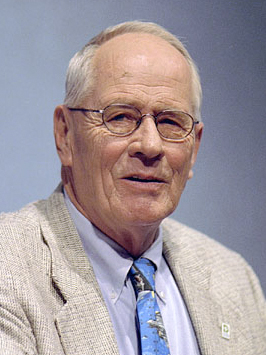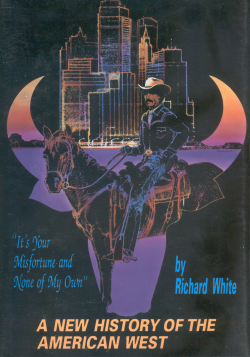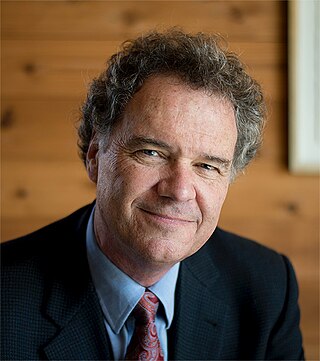External links
| Volumes |
|
|---|---|
| Authors |
|
| International | |
|---|---|
| National | |
| Academics | |
| Other | |
Richard White (born 1947) is an American historian who is the Margaret Byrne Professor of American History Emeritus at Stanford University. Earlier in his career, he taught at the University of Washington, University of Utah, and Michigan State University.
White received his bachelor's degree from the University of California, Santa Cruz, and his M.A. and Ph.D. from the University of Washington. [1] He was chosen for the MacArthur Fellows Program in 1995, and was elected a Member of the American Philosophical Society in 2016. [2] White was founding director of Stanford's Spatial History Project, [3] which implements digital technologies and analyses to illuminate patterns and anomalies for research purposes.
He is a two-time winner of the Francis Parkman Prize, past President of the Organization of American Historians, and the author of books about the American West, Native American history, the United States in the Gilded Age, railroads, capitalism, and environmental history.

The Central Pacific Railroad (CPRR) was a rail company chartered by U.S. Congress in 1862 to build a railroad eastwards from Sacramento, California, to complete the western part of the "First transcontinental railroad" in North America. Incorporated in 1861, CPRR ceased operation in 1959 when assets were formally merged into the Southern Pacific Railroad.

Stephen Edward Ambrose was an American historian, most noted for his biographies of U.S. Presidents Dwight D. Eisenhower and Richard Nixon. He was a longtime professor of history at the University of New Orleans and the author of many bestselling volumes of American popular history.

Amasa Leland Stanford was an American attorney, industrialist, philanthropist, and Republican Party politician from California. He served as the 8th Governor of California from 1862 to 1863 and represented the state in the United States Senate from 1885 until his death in 1893. He and his wife Jane founded Stanford University, named after their late son.

Collis Potter Huntington was an American industrialist and railway magnate. He was one of the Big Four of western railroading who invested in Theodore Judah's idea to build the Central Pacific Railroad as part of the first U.S. transcontinental railroad. Huntington helped lead and develop other major interstate lines, such as the Southern Pacific Railroad and the Chesapeake & Ohio Railway (C&O), which he was recruited to help complete. The C&O, completed in 1873, fulfilled a long-held dream of Virginians of a rail link from the James River at Richmond to the Ohio River Valley. The new railroad facilities adjacent to the river there resulted in expansion of the former small town of Guyandotte, West Virginia into part of a new city which was named Huntington in his honor.

The Crédit Mobilier scandal was a two-part fraud conducted from 1864 to 1867 by the Union Pacific Railroad and the Crédit Mobilier of America construction company in the building of the eastern portion of the first transcontinental railroad. The story was broken by The New York Sun during the 1872 campaign of Ulysses S. Grant.

In United States history, the Gilded Age is roughly the period from 1865 to 1904, which occurred between the Reconstruction Era and the Progressive Era. It was named after a Mark Twain novel by historians in the 1920s who saw this interval of economic expansion as an era of materialistic excesses combined with extreme poverty.

Eric Foner is an American historian. He writes extensively on American political history, the history of freedom, the early history of the Republican Party, African American biography, the American Civil War, Reconstruction, and historiography, and has been a member of the faculty at the Columbia University Department of History since 1982. He is the author of several popular textbooks. According to the Open Syllabus Project, Foner is the most frequently cited author on college syllabi for history courses.

Robber baron is a term of social criticism originally applied to certain wealthy and powerful 19th-century American businessmen. The term appeared as early as the August 1870 issue of The Atlantic Monthly magazine. By the late 19th century, the term was typically applied to businessmen who used exploitative practices to amass their wealth. Those practices included unfettered consumption and destruction of natural resources, influencing high levels of government, wage slavery, squashing competition by acquiring their competitors to create monopolies and/or trusts that control the market, and schemes to sell stock at inflated prices to unsuspecting investors. The term combines the sense of criminal ("robber") and illegitimate aristocracy.
Alan Zelick Trachtenberg was an American historian and the Neil Gray Jr. Professor of English and professor emeritus of American Studies at Yale University.
David Plowden, is an American photographer who has made historical documentary photography of urban cities, steam trains, American farmlands, and small towns.

Charles King is the Professor of International Affairs and Government at Georgetown University, where he previously served as the chairman of the faculty of the Edmund A. Walsh School of Foreign Service.

"It's Your Misfortune and None of My Own": A New History of the American West is a history of the American West. The book's title comes from the lyrics to the traditional cowboy ballad Git Along Little Dogies. The 684 page history was written by Richard White and first published by the University of Oklahoma Press in 1991. It covers the history of the West from the Spanish conquest in the 16th century to the presidency of Ronald Reagan.

David Levering Lewis is an American historian, a Julius Silver University Professor, and professor emeritus of history at New York University. He is twice winner of the Pulitzer Prize for Biography or Autobiography, for part one and part two of his biography of W. E. B. Du Bois. He is the first author to win Pulitzer Prizes for biography for two successive volumes on the same subject.
The Francis Parkman Prize, named after Francis Parkman, is awarded by the Society of American Historians for the best book in American history each year. Its purpose is to promote literary distinction in historical writing. The Society of American Historians is an affiliate of the American Historical Association.

Edward Lynn "Ed" Ayers is an American historian, professor, administrator, and university president. In July 2013, he was awarded the National Humanities Medal by President Barack Obama at a White House ceremony for Ayers's commitment "to making our history as widely available and accessible as possible." He served as the president of the Organization of American Historians in 2017–18.
Thomas Jacob Noel, often introduced in media interviews as Dr. Colorado, is an American historian specializing in the history of the Rocky Mountain West, and especially of the state of Colorado. He is a professor of history at the University of Colorado at Denver, where he teaches classes in the history of the American West, Colorado, Denver, historic preservation, mining and railroads, national parks, and Western art and architecture. He is the co-author or author of more than fifty books, numerous articles, and newspaper columns. He is the director of the Center for Colorado Studies at the Denver Public Library. The center provides many resources for students including Colorado books, book reviews, short-documentaries, as well as Native American, Hispanic, and other resource guides.

James F. Brooks is an American historian whose work on slavery, captivity and kinship in the Southwest Borderlands was honored with major national history awards: the Bancroft Prize, Francis Parkman Prize, the Frederick Jackson Turner Award and the Frederick Douglass Prize. He is the Gable Professor of Early American History at the University of Georgia, and Research Professor Emeritus of History and Anthropology at the University of California, Santa Barbara, where he serves as senior contributing editor of the journal The Public Historian
Edward Countryman is an American historian.
Jared Farmer is the Walter H. Annenberg Professor of History at the University of Pennsylvania. He specializes in environmental history, landscape studies, and the North American West.
Shelley Fisher Fishkin is the Joseph S. Atha Professor of the Humanities and a professor of English at Stanford University.